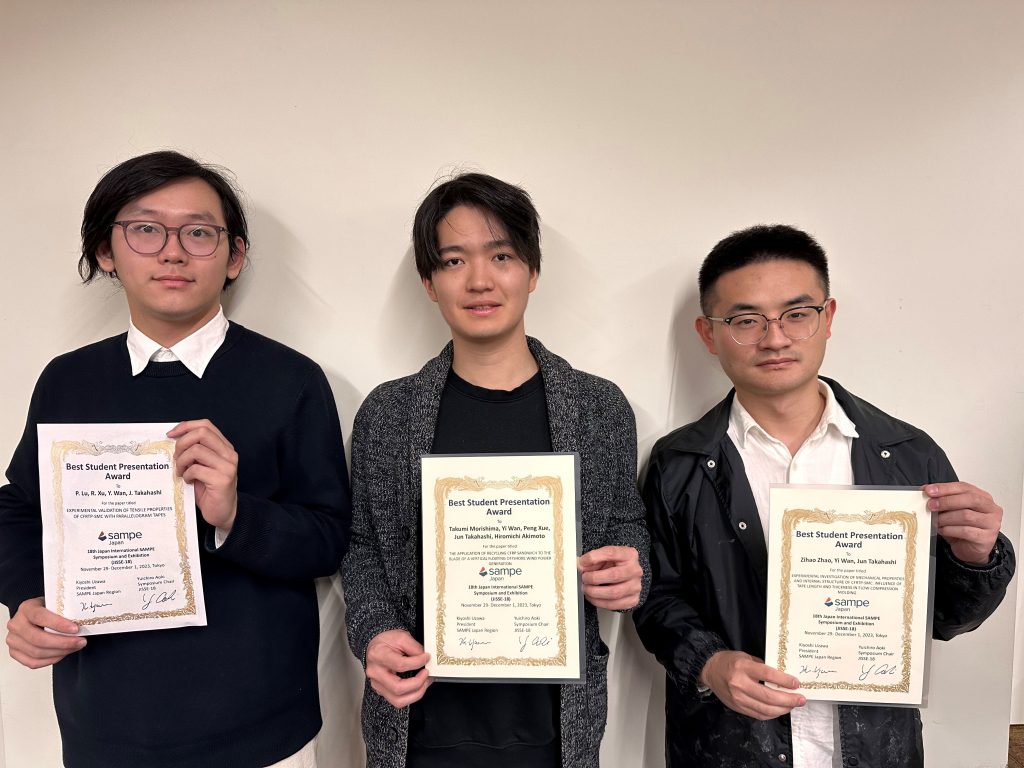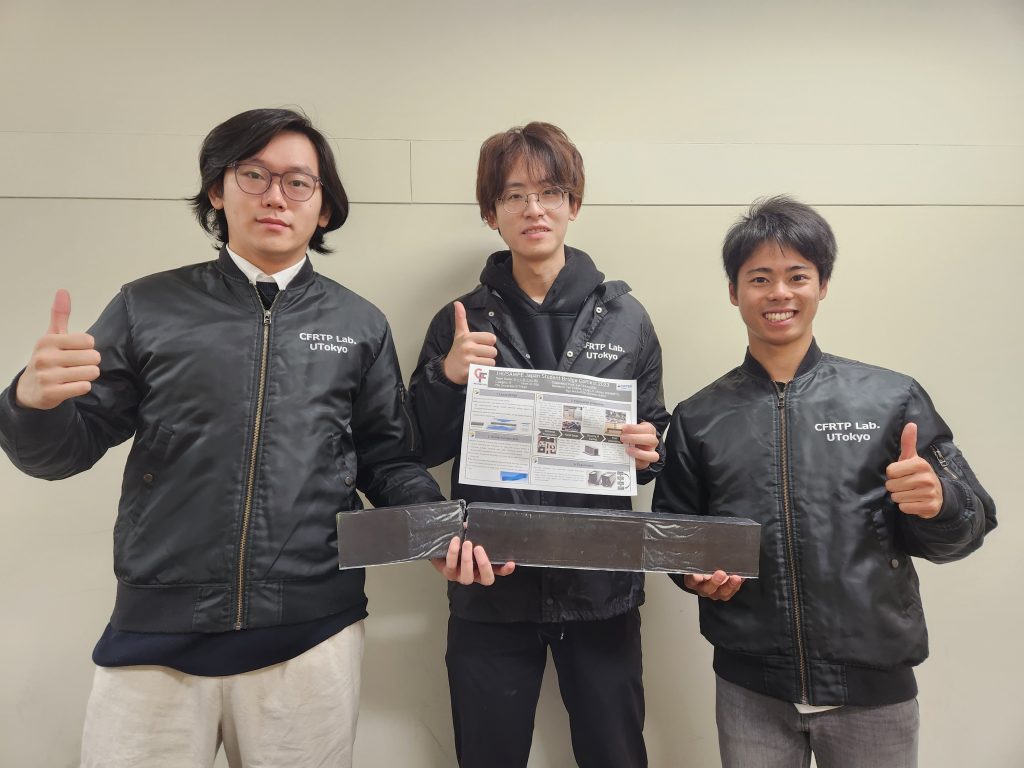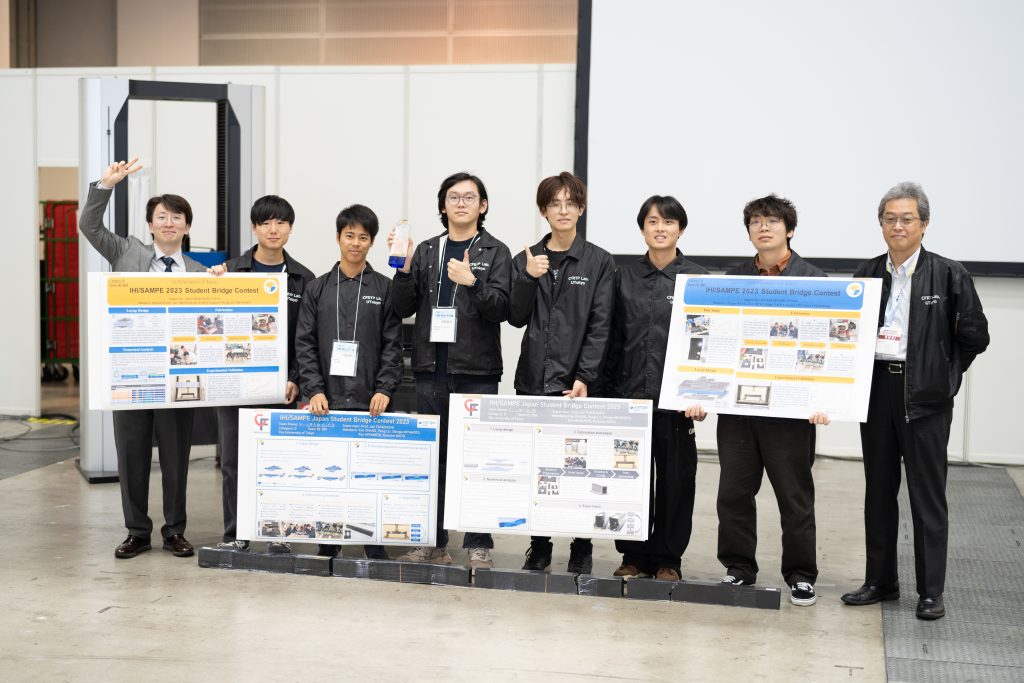Students from the Takahashi-Wan Lab Win Two Consecutive Victories in Category R at the 2024 IHI/SAMPE Japan Student Bridge Contest!
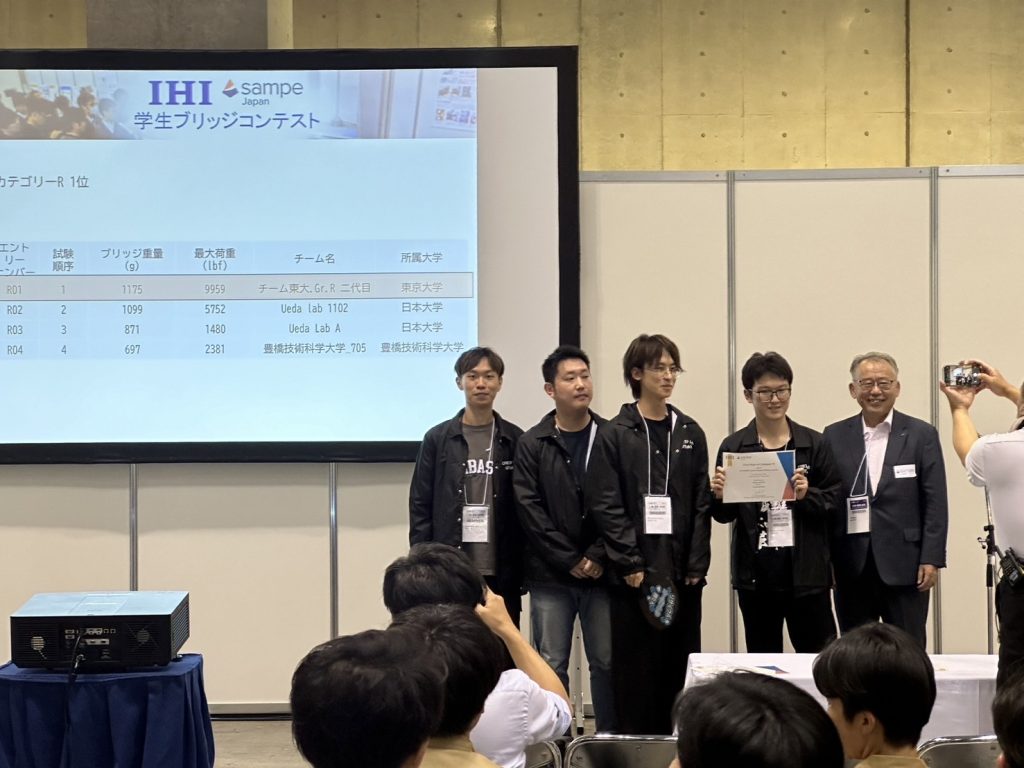
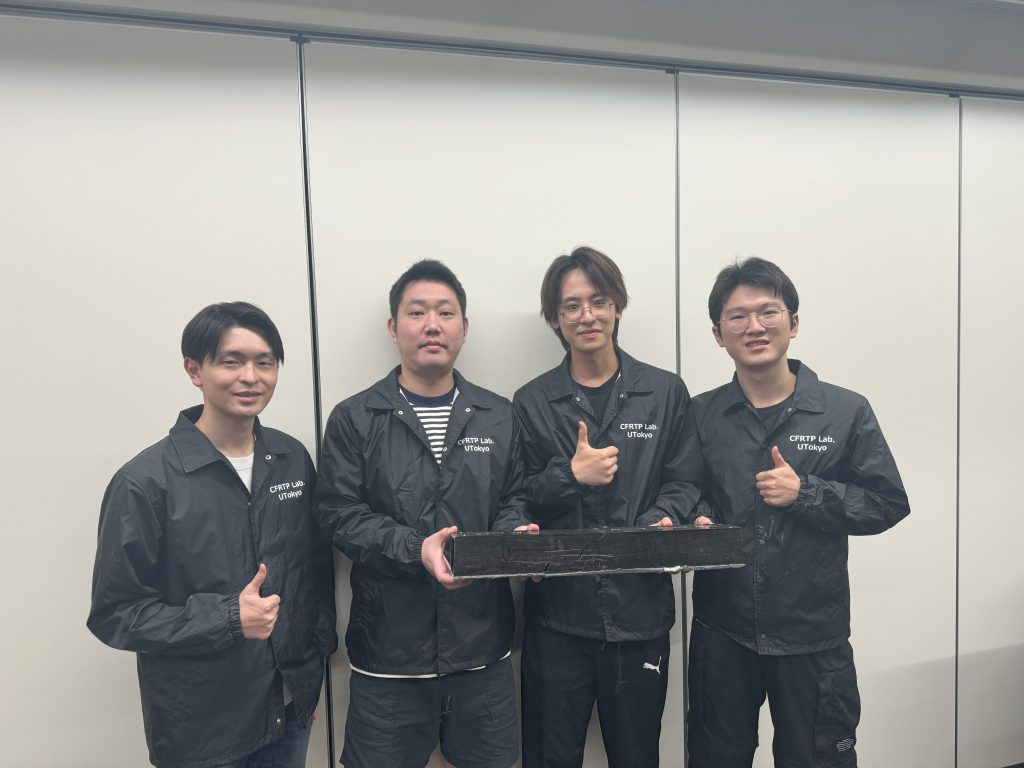
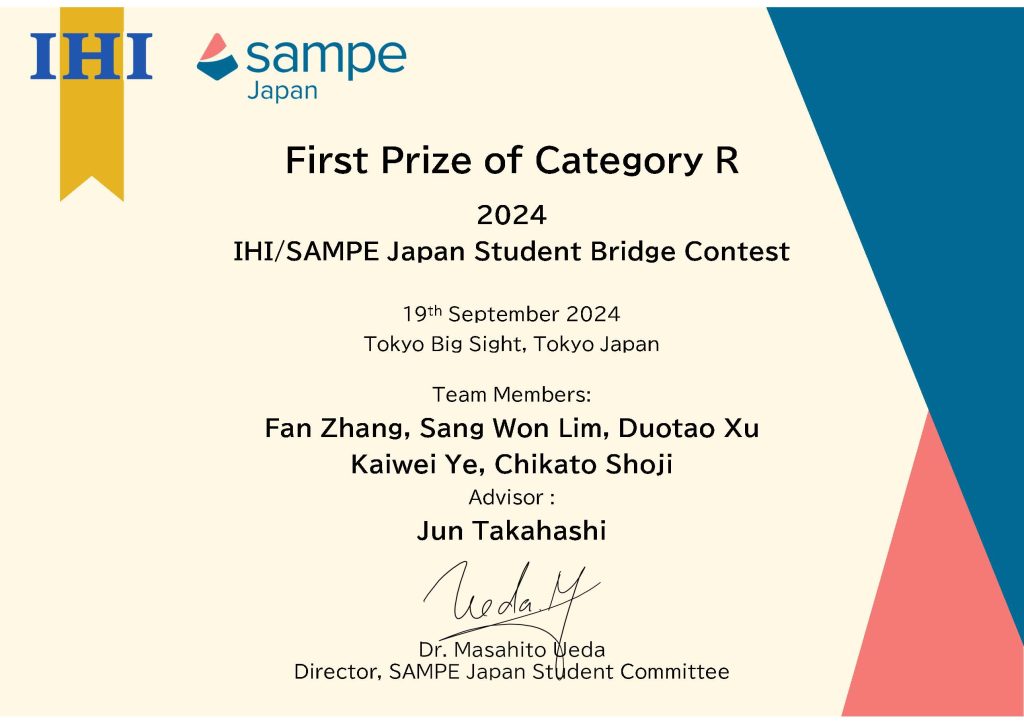
Yunshi Huang (D1), Department of Systems Innovation, received the Socrates Acevedo Best Student Paper Award at the 24th International Conference on Petroleum Phase Behavior and Fouling
Project Researcher Pan Qianqian and Professor Akihiro Nakao received the Best Paper Award at the IEEE ICC 2024
On 12th June 2024, Project Researcher Pan Qianqian and Professor Akihiro Nakao, Nakao Laboratory, Department of Systems Innovation, received the Best Paper Award at the IEEE ICC 2024.
Click here for details
Shouhei Itokazu (M1), Department of Systems Innovation, received best presentation award for CCS study at 2024 spring conference of the Japanese Association for Petroleum Technology
On 5th June 2024, Shouhei Itokazu (M1), Tsuji Lab., Department of Systems Innovation, received best presentation award for CCS study at 2024 spring conference of the Japanese Association for Petroleum Technology.
Click here for details
Rei Taguchi (D3) , Department of Systems Innovation, recieved Excellence Research Award at GPIF Finance Awards for Students
Keigo Kinoshita (M1) and Masayoshi Kurihara (B4), Department of Systems Innovation, receied the first prize at Sports Data Science Competition 2023 (Football)
On 7th January 2024, Keigo Kinoshita (M1) and Masayoshi Kurihara (B4), Shimada Lab., Department of Systems Innovation, receied the first prize at Sports Data Science Competition 2023 (Football).
Click here for details
At Takahashi-Wan Laboratory, Mr. Takumi Morishima (D1) received the Best Student Presentation Award, Mr. Peng Lu (M1) and Mr. Zihao Zhao (D3) received the Student Presentation Award at the 18th Japan International SAMPE Symposium and Exhibition on December 1, 2023.
- Name, Faculty/Graduate School, Department (Stream / Program) / Major: Department of Systems Innovation, Graduate School of Engineering, Takumi Morishima (D1) Peng Lu (M1) Zihao Zhao (D3)
- Name of the award and a short explanation about the award: Student Best Student Presentation Award
- About awarded research:
Best Student Presentation Award: T. Morishima, Y. Wan, P. Xue, J. Takahashi and H. Akimoto, The application of recycling CFRP sandwich to the blade of a vertical floating offshore wind power generation LCA and LCC of the environmental and cost impacts of applying recycled carbon fiber to the blades of a vertical floating offshore wind turbine has quantitatively revealed the trade-off between the environmental impact reduction and cost increase of recycled CFRP. Student Presentation Award: P. Lu, R. Xu, Y. Wan and J. Takahashi, Experimental validation of tensile properties of CFRTP-SMC with parallelogram tapes Carbon fiber reinforced thermoplastic sheet molding compounds (CFRTP-SMC) are suitable for mass production of complex-shaped components and are beginning to be widely used in the automotive, aerospace and construction industries, but the tape shape has traditionally been rectangular. In this study, for the first time in the world, it was shown by Monte Carlo simulation that parallelogram-shaped SMC exhibits better mechanical properties, and this was verified by experiment. Student Presentation Award: Z. Zhao, Y. Wan and J. Takahashi, Experimental investigation of mechanical properties and internal structure of CFRTP-SMC: influence of tape length and thickness in flow compression molding During the heat-compression molding of complex-shaped components by carbon fiber reinforced thermoplastic sheet molding compounds (CFRTP-SMC), it is known that the flow of the material changes the tape shape and has a negative influence on the mechanical properties. In this study, the thickness and length of the tape were varied and the degree of influence of the material flow distance during molding on the internal structure and mechanical properties of the SMC was systematically clarified.
- Awardee’s impression & future plan:
Takumi Morishima: I am delighted to have received such a prestigious award. I will continue to engage my research in line with my interests and passions. Peng Lu: I am extremely honored to receive this award. I would like to express my sincere gratitude to my supervisors and seniors who have been the driving force behind my growth, and considering the vastness and depth of the field of CFRTP-SMC, I am keenly aware that there is still much to learn and new knowledge and skills to acquire. I will continue to devote myself to my research path. Zihao Zhao: It was a great honor to receive this award. This international conference provided me with a valuable opportunity to share insights, receive positive feedback, and interact with experts in the field, which inspired my passion for materials science. In the future, I plan to conduct more extensive experiments to deepen my understanding of tape length, thickness, and mechanical properties.
Students in Takahashi/Wan Laboratory won the first prize in the newly established category R (recycled carbon fiber) of the “2023 IHI/SAMPE Japan Student Bridge Contest”!
- Name, Faculty/Graduate School, Department (Stream / Program) / Major: Department of Systems Innovation, School of Engineering, Fan Zhang (M2), Shingo Miyamoto (M2), Peng Lu (M1), Ryo Miyamoto (B4), Keisuke Naito (B4)
- Name of the award and a short explanation about the award: Student TheSAMPE (The Society for the Advancement of Material and Process Engineering) Student Bridge Contest is an annual student competition (about 100 teams) for lightweight bridges made of fiber-reinforced composite materials. This report is from the Japan preliminary round (21 teams participated) in the Recycled Carbon Fiber category (Category R).
- About awarded research:
In the bridge contest, bridges made of fiber-reinforced composites designed and manufactured by student teams from various universities will be evaluated by a three-point bending test, and the lightest bridge that exceeds the specified load will be declared the winner. The Recycled Carbon Fiber Category (Category R) was newly established in light of the recent trend toward circularity, and only requires the use of recycled carbon fiber non-woven fabrics provided by SAMPE Japan and the maximum external dimensions of the bridge, with no specification on resin or molding method.
- Awardee’s impression & future plan:
We are very honored to receive this award. We would like to express our deepest gratitude to everyone in our laboratory who provided us with various kinds of support in receiving this award. Even though we used recycled carbon fiber for the first time, we were able to obtain better results than expected. We hope that next year we will be able to take full advantage of the material’s performance and produce even lighter and better bridges.
Ryotaro Kobayashi (M1) , Izumi-Lab, Department of Systems Innovation, received Excellence Award at the JSAI 37th Annual Conference
On 16th November 2023, Ryotaro Kobayashi (M1) , Izumi-Lab, Department of Systems Innovation, recieved Excellence Award at the Japanese Society for Artificial Intelligence (JSAI) 37th Annual Conference.
Click here for details






